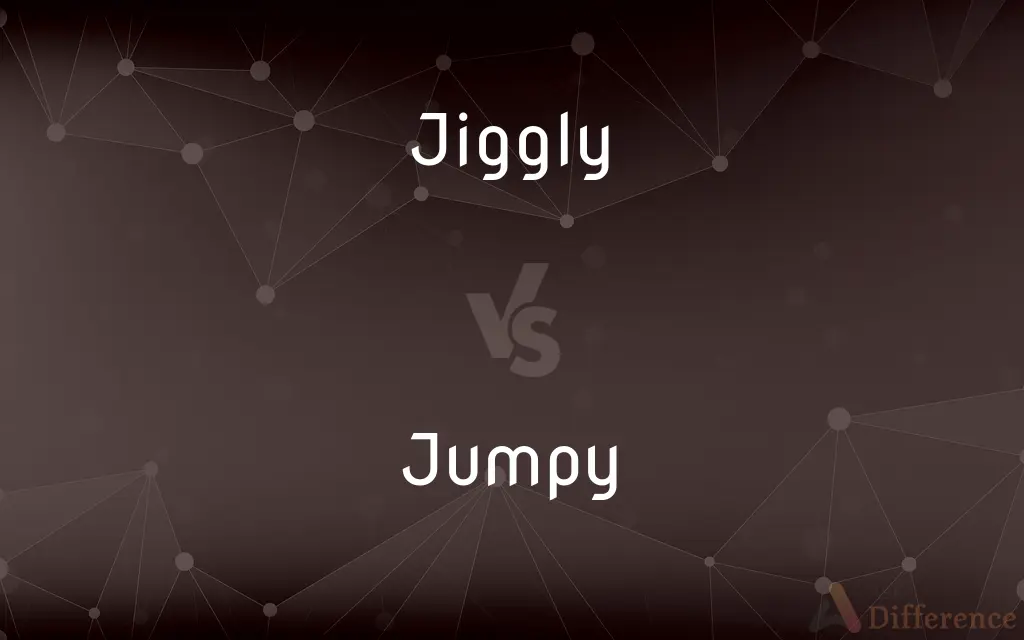Jiggly vs. Jumpy — What's the Difference?
By Tayyaba Rehman — Published on January 13, 2024
Jiggly describes a physical characteristic of being soft and wobbly, while jumpy refers to a nervous or anxious behavior, often involving sudden movements.

Difference Between Jiggly and Jumpy
Table of Contents
ADVERTISEMENT
Key Differences
Jiggly is typically used to describe an object's physical quality, specifically its tendency to shake or wobble softly, like gelatin or a soft mattress. Jumpy, on the other hand, characterizes a person's or animal's behavior as being easily startled or prone to sudden movements, often due to nervousness or anxiety.
The term jiggly often conveys a sense of elasticity or a soft, bouncy nature, as seen in certain foods or materials. Jumpy is more about a reactive state, suggesting quick, abrupt responses to stimuli, indicative of restlessness or unease.
Jiggly is generally used in a neutral or playful context, without emotional connotations. Conversely, jumpy often implies a heightened emotional state, such as fear, apprehension, or excitement.
While jiggly can be perceived as a tactile sensation, jumpy is more about a psychological or emotional state. Jiggly objects are physically interacted with, whereas jumpy individuals react to their environment.
In summary, jiggly is about physical characteristics that are soft and wobbly, while jumpy describes a state of being easily startled or nervous, with a propensity for sudden movements.
ADVERTISEMENT
Comparison Chart
Description
Describes physical wobbliness or softness.
Characterizes nervous, abrupt behavior.
Context
Used for objects/materials.
Used to describe behavior of persons/animals.
Connotation
Neutral or playful, tactile.
Emotional, reactive.
Sensory Aspect
Tactile, related to touch and feel.
Behavioral, related to reactions and emotions.
Typical Usage
Foods, soft materials.
Behavioral description in nervous situations.
Compare with Definitions
Jiggly
Jiggly refers to something that is soft and wobbly to the touch.
The jelly was so jiggly that it wobbled when the plate moved.
Jumpy
Jumpy often describes a sudden, involuntary movement.
The loud noise made the dog jumpy.
Jiggly
Jiggly also refers to the characteristic of being slightly loose and bouncy.
Her jiggly bracelet chimed with every movement.
Jumpy
Jumpy describes someone who is easily startled or quick to react.
She was feeling jumpy after watching the horror movie.
Jiggly
It describes a gentle, shaking movement.
The jiggly mattress made it fun for the kids to jump on.
Jumpy
It can also mean being in a state of heightened alertness.
Working late at the office alone made her jumpy.
Jiggly
It can describe objects that are not solidly firm.
The jiggly toys amused the toddler for hours.
Jumpy
It can refer to nervous or anxious behavior.
Before the interview, he was visibly jumpy and restless.
Jiggly
Jiggly is often used to describe the consistency of certain foods.
The pudding’s jiggly texture was perfect.
Jumpy
Jumpy indicates a readiness to react hastily.
The jumpy audience gasped at every shadow during the play.
Jiggly
To move or rock lightly up and down or to and fro in an unsteady, jerky manner
The gelatin jiggled on the plate.
Jumpy
Characterized by fitful, jerky movements.
Jiggly
To cause to jiggle.
Jumpy
On edge; nervous.
Jiggly
A jiggling motion.
Jumpy
Nervous and excited.
Jiggly
That jiggles
Jumpy
Tending to jump; full of jumps.
Jumpy
Jumping, or inducing to jump; characterized by jumps;
Jumpy
Being in a tense state
Common Curiosities
Can jiggly be used to describe a person’s movement?
Yes, it can describe a person's movement that is softly wobbly or bouncy.
Is jiggly a term used in cooking?
Yes, it's often used to describe the texture of certain foods like jelly or custard.
What does jiggly typically describe?
Jiggly usually describes a soft, wobbly characteristic of an object or substance.
In what situations might someone be described as jumpy?
Someone might be described as jumpy when they are nervous, anxious, or easily startled.
What kind of emotional state does being jumpy imply?
Being jumpy implies a state of nervousness, anxiety, or heightened alertness.
Does jumpy always indicate fear?
Not always fear, but it generally indicates a state of nervousness or heightened alertness.
How can someone stop being jumpy?
Relaxation techniques, calming activities, or addressing the underlying cause of nervousness can help.
What can cause a person to be jumpy?
Stress, fear, anxiety, or even excessive caffeine intake can make a person jumpy.
Is jiggly an official term in sensory analysis?
In sensory analysis, especially in food technology, jiggly is used to describe texture.
Does jumpy refer to physical or psychological aspects?
Jumpy primarily refers to psychological aspects that manifest in physical behavior.
Can animals be described as jiggly?
Rarely, as jiggly is more appropriate for inanimate objects or substances with a soft consistency.
Is jiggly considered a positive or negative trait?
It's usually neutral or positive, often used playfully or descriptively without negative connotations.
Can jumpy behavior be a symptom of a medical condition?
Yes, it can be associated with conditions like anxiety disorders or hyperthyroidism.
Are there any industries where jiggly is a technical term?
Yes, in food and materials industries, jiggly can describe specific textures or properties.
Can both jiggly and jumpy be used metaphorically?
Yes, both can be used metaphorically to describe characteristics or behaviors.
Share Your Discovery

Previous Comparison
Abiotic Factors vs. Biotic Factors
Next Comparison
CSS vs. SCSSAuthor Spotlight
Written by
Tayyaba RehmanTayyaba Rehman is a distinguished writer, currently serving as a primary contributor to askdifference.com. As a researcher in semantics and etymology, Tayyaba's passion for the complexity of languages and their distinctions has found a perfect home on the platform. Tayyaba delves into the intricacies of language, distinguishing between commonly confused words and phrases, thereby providing clarity for readers worldwide.
















































